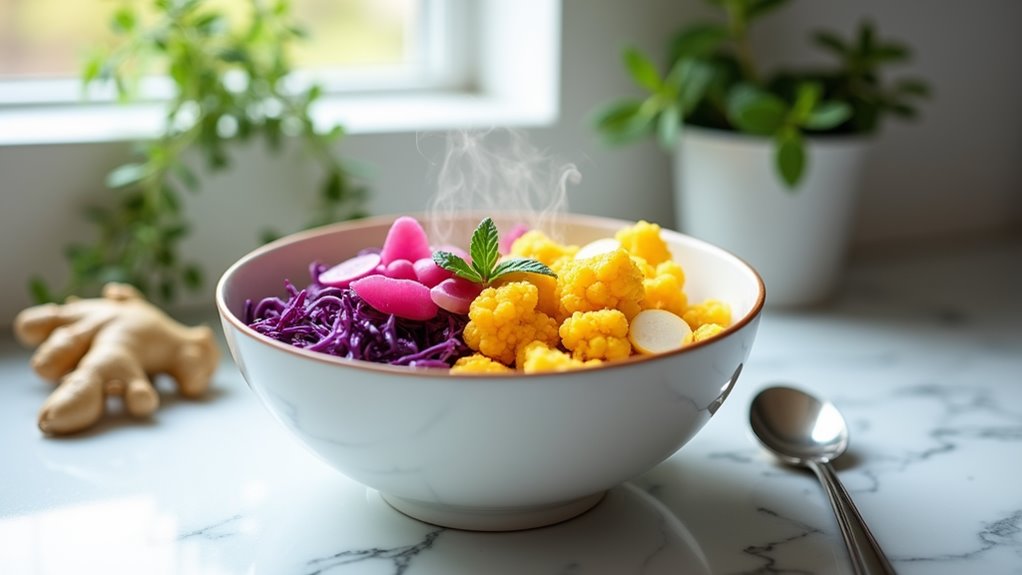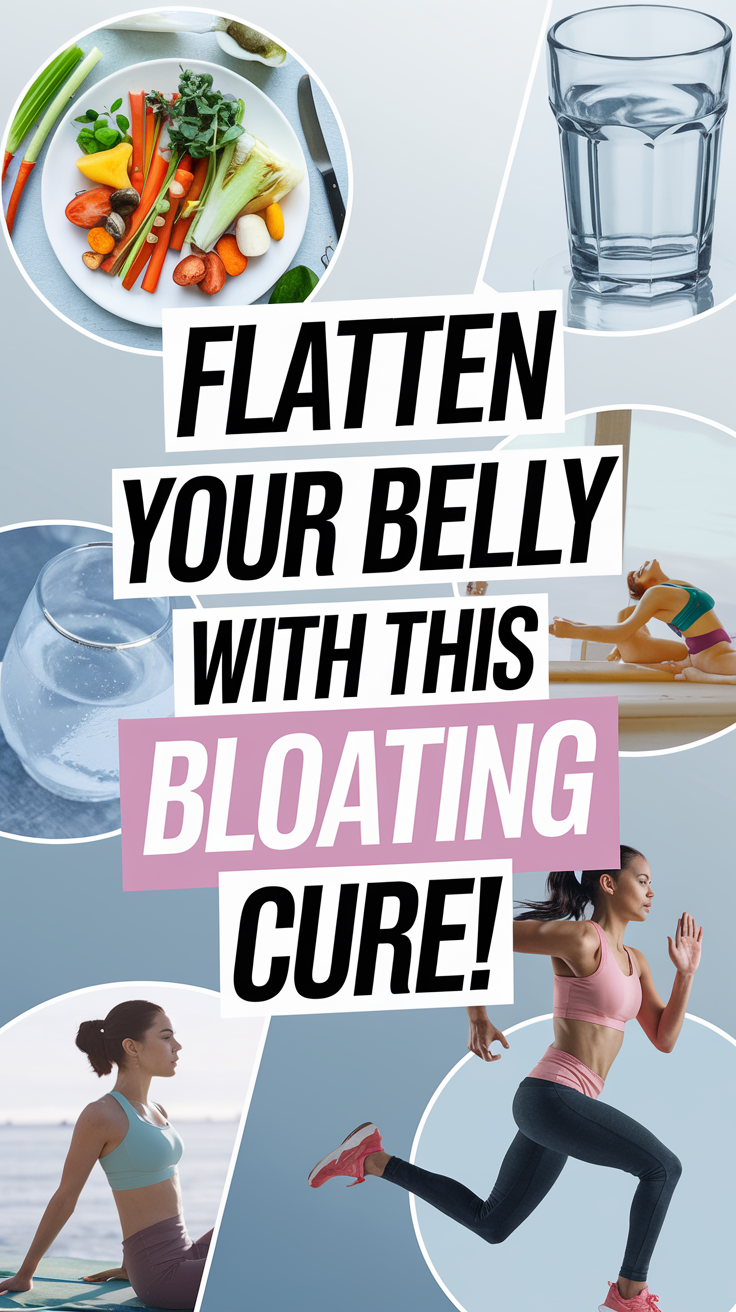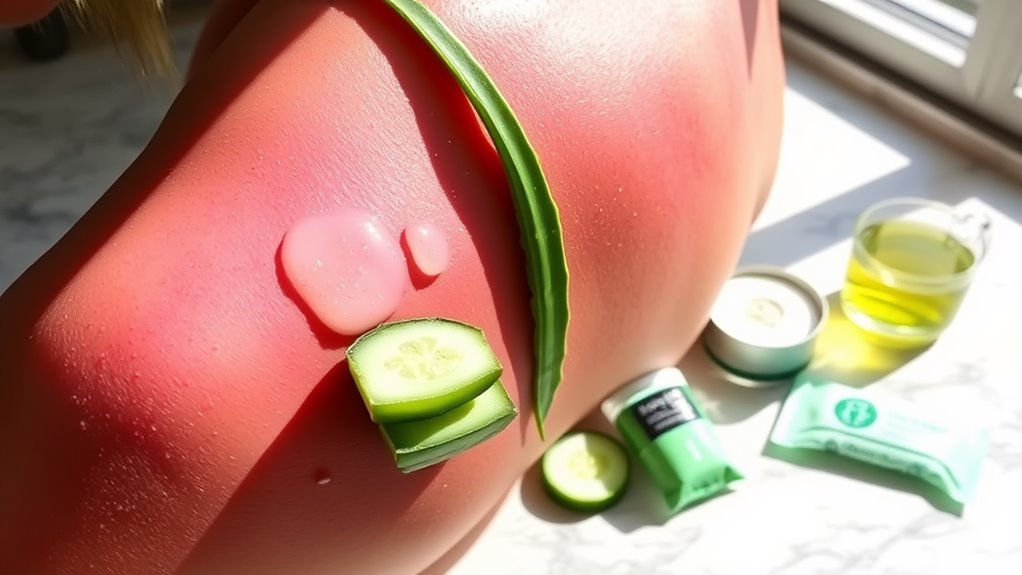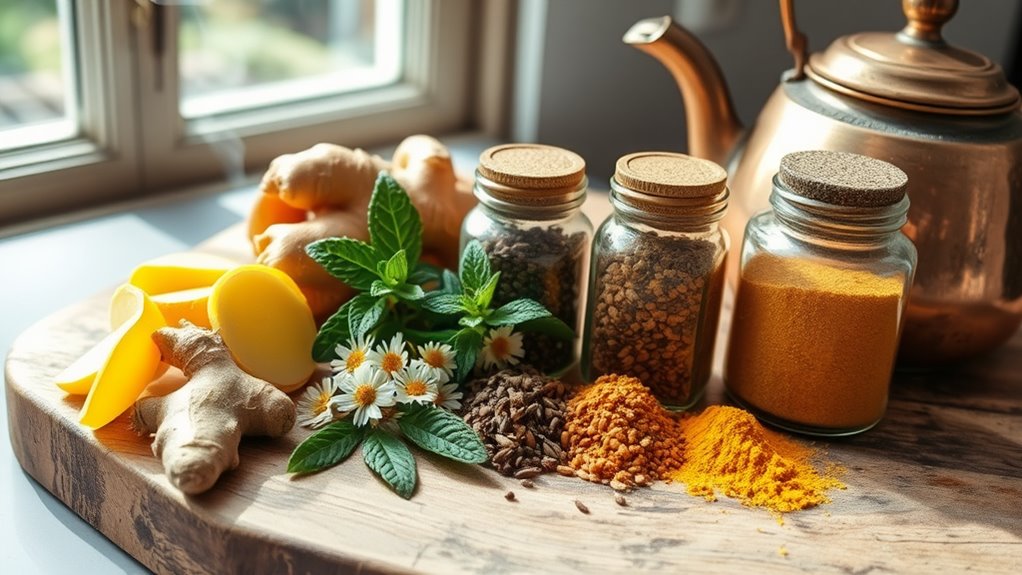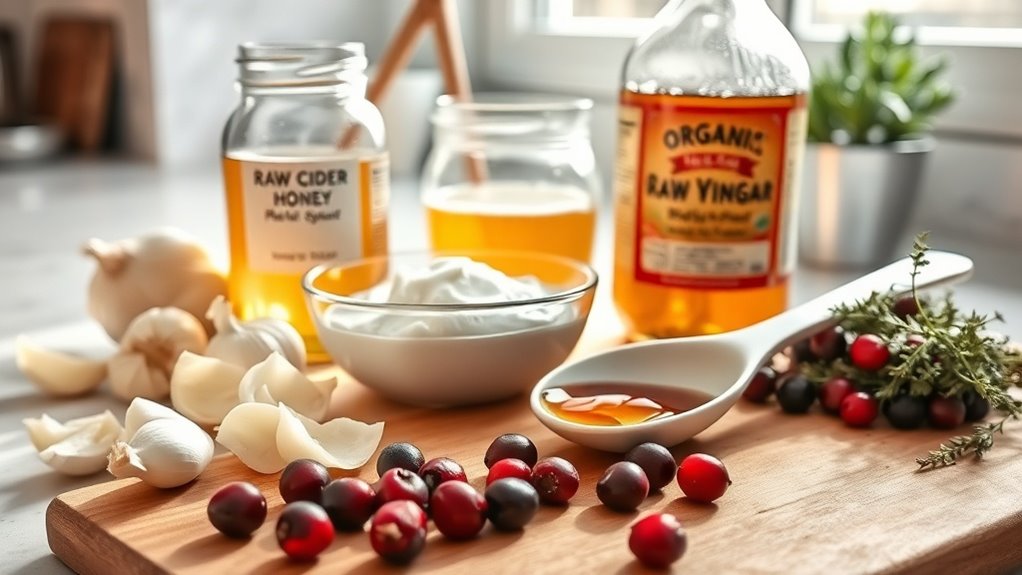Flatten Your Belly With This Bloating Cure!
You can reduce belly bloat quickly by making smart changes to your eating habits. Start by avoiding common triggers like carbonated drinks, dairy products, and food combinations that slow digestion. Focus on consuming probiotic-rich foods like yogurt and kimchi to support gut health, and try natural remedies like peppermint tea and ginger. Practicing mindful eating and proper food timing will help you reveal lasting solutions for a flatter stomach.
Key Takeaways
-
Practice mindful eating by taking smaller bites and chewing thoroughly to minimize swallowed air during meals.
-
Avoid trigger food combinations like mixing proteins with starches or consuming dairy with acidic foods.
-
Incorporate probiotic-rich foods like yogurt and kimchi to support healthy gut bacteria and reduce inflammation.
-
Drink warm lemon water in the morning and stay hydrated with eight glasses throughout the day.
-
Add natural digestive aids like peppermint tea, ginger, or fennel to calm the gut and reduce bloating.
Understanding What Causes Bloating
Why do so many people experience bloating? You’re not alone – this uncomfortable condition affects millions daily. Your belly can become swollen and tight due to several common triggers that you might encounter regularly.
The main culprits behind your bloated belly include eating too quickly, consuming gas-producing foods like beans and cabbage, drinking carbonated beverages, and having food sensitivities. Stress and hormonal changes can also contribute to this issue.
Many people find that certain lifestyle habits, like chewing gum or eating large portions, make bloating worse.
Before trying various bloated belly remedies, it’s essential to identify what’s causing your discomfort. Understanding your personal triggers is the first step toward finding lasting relief and preventing future episodes.
Common Foods That Trigger Belly Bloat
While many foods can contribute to bloating, certain ingredients are more likely to cause discomfort than others. You’ll want to watch out for these common triggers that might be causing your belly bloat and making your clothes feel tight.
| Problem Foods | Why They Bloat |
|---|---|
| Dairy Products | Lactose intolerance |
| Beans & Lentils | Complex sugars |
| Carbonated Drinks | Trapped gas bubbles |
| Artificial Sweeteners | Hard-to-digest sugar alcohols |
| High-Salt Foods | Water retention |
Like many others dealing with bloating, you might notice that these foods affect you differently throughout the day. Your body’s response can also change based on portion sizes and food combinations. By identifying your personal triggers, you’ll be better equipped to make choices that keep your tummy happy and flat.
The Role of Gut Health in Bloating
Beyond specific food triggers, your gut’s overall health plays a central role in how your body processes what you eat. Your digestive system relies on a delicate balance of beneficial bacteria to break down food and prevent excess gas production.
When this balance gets disrupted, you’re more likely to experience bloating and discomfort. Your gut microbiome affects everything from nutrient absorption to inflammation levels in your body.
If you’ve been struggling with frequent bloating, you might’ve an imbalance in your gut bacteria. This can happen due to stress, antibiotics, or a diet high in processed foods.
Supporting your gut health with probiotic-rich foods like yogurt, kimchi, and kombucha can help restore balance and reduce those uncomfortable bloated feelings that keep you from feeling your best.
Essential Digestive Enzymes for a Flat Stomach
Inside your digestive system, specialized proteins called digestive enzymes work tirelessly to break down the food you eat into smaller, more manageable components. When you’re lacking certain enzymes, you’ll likely experience bloating and discomfort after meals.
You’ll want to guarantee you have sufficient amounts of three essential enzymes: amylase for carbohydrates, protease for proteins, and lipase for fats. Your body naturally produces these, but you can boost their levels through enzyme-rich foods like pineapple, papaya, mango, and fermented vegetables.
If you’re still struggling with bloating, you might benefit from a high-quality digestive enzyme supplement, especially one containing lactase if you’re sensitive to dairy. Take it about 30 minutes before meals to maximize its effectiveness and say goodbye to that uncomfortable bloated feeling.
Anti-Bloating Herbs and Supplements
When digestive issues strike, certain herbs and supplements can provide quick relief from bloating and gas. You’ll find these natural remedies particularly effective when paired with proper digestive enzymes for ideal gut health.
| Herb/Supplement | Benefits | Recommended Use |
|---|---|---|
| Peppermint | Reduces gas, calms gut | Tea or capsule |
| Ginger | Eases nausea, aids digestion | Fresh or supplement |
| Fennel | Relieves cramping, bloating | Seeds or tea |
You’re not alone in seeking natural solutions for digestive comfort. Consider adding these powerful botanicals to your daily routine. Start with small doses and gradually increase as needed. For best results, take these supplements before meals or when you first notice discomfort. Remember to consult your healthcare provider before starting any new supplement regimen, especially if you’re taking medications.
Hydration Strategies to Combat Bloating
Although many people reach for food-based remedies to fight bloating, proper hydration plays an essential role in preventing and relieving digestive discomfort.
You’ll want to drink at least eight glasses of water daily, spacing them between meals rather than during eating to avoid diluting stomach acids.
Start your day with warm lemon water to kick-start digestion and flush out toxins. If you’re feeling bloated, try sipping on cucumber-infused water or coconut water, which contain natural electrolytes to help balance fluid levels.
Avoid carbonated beverages, which can introduce extra gas into your system.
Remember to reduce caffeine and alcohol intake, as they can lead to dehydration and worsen bloating.
Instead, opt for bloat-fighting herbal teas like peppermint, ginger, or fennel between meals.
Exercise Moves That Reduce Bloat
Physical activity complements proper hydration as a powerful bloat-fighting tool. When you feel bloated, try these targeted exercises to get relief and feel like yourself again.
Start with gentle twists while seated or standing, rotating your torso from side to side. Next, move into cat-cow poses on your hands and knees, alternating between arching and rounding your back.
Wind-relieving pose, where you lie on your back and hug your knees to your chest, helps release trapped gas.
Take a brisk 15-minute walk to stimulate digestion and reduce bloating naturally. For a more intense workout, try bicycle crunches or plank positions – they’ll activate your core muscles while massaging your digestive organs.
Remember to breathe deeply during each movement to maximize the bloat-reducing benefits.
Mindful Eating Techniques
Since mindful eating can greatly reduce bloating, it’s essential to develop awareness of your eating habits and patterns.
You’ll join countless others who’ve discovered the power of slowing down and truly experiencing each meal.
Start by putting away your phone and turning off the TV during meals. Take smaller bites and chew each one 20-30 times before swallowing. You’ll notice flavors and textures you’ve been missing, plus your digestion will improve.
Set your fork down between bites and take deep breaths. Notice when you’re actually full, rather than eating until your plate is empty.
Listen to your body’s hunger signals and eat only when you’re genuinely hungry. Together with fellow mindful eaters, you’ll experience less bloating and better digestion.
The Impact of Stress on Bloating
When you’re stressed, your body releases hormones that can wreak havoc on your digestive system, leading to increased bloating and discomfort.
Your gut becomes more sensitive, and you might notice yourself swallowing more air while eating, which only makes bloating worse.
Like many others dealing with stress-related bloating, you can take control by practicing stress-management techniques.
Deep breathing exercises, regular meditation, and gentle yoga can help calm your nervous system.
You’ll also benefit from setting aside dedicated time for meals, away from work or other stressors.
Meal Timing and Portion Control
How you time your meals and manage portion sizes plays an essential role in preventing bloating.
You’ll want to eat at consistent times each day to help your digestive system develop a reliable rhythm. Try spacing your meals 3-4 hours apart and avoid eating within 2-3 hours of bedtime.
When it comes to portion control, you’re better off eating smaller meals throughout the day rather than three large ones.
Start with portions that fit in the palm of your hand, and eat slowly to give your brain time to register fullness.
Like many of us dealing with bloating, you’ll find that using smaller plates and bowls naturally helps control portions while still letting you feel satisfied after meals.
Food Combinations to Avoid
Beyond watching your portions and meal timing, certain food combinations can trigger bloating and digestive discomfort.
You’ll want to avoid mixing high-protein foods like meat and fish with starchy carbohydrates such as potatoes or pasta. These combinations require different digestive enzymes, which can slow down your digestion and cause gas.
Don’t pair fruits with heavy meals, as they digest quickly and can ferment while waiting for slower-digesting foods to process.
Skip combining dairy products with acidic foods like tomatoes or citrus fruits, as this can lead to curdling in your stomach and increase bloating.
Also, mixing different types of proteins in one meal, such as beans with meat, can overwhelm your digestive system and make you feel uncomfortably full.
Probiotic-Rich Foods for Better Digestion
Since your digestive system thrives on beneficial bacteria, incorporating probiotic-rich foods into your daily diet can greatly reduce bloating and improve gut health. You’ll join countless others who’ve discovered the natural healing power of fermented foods that support your microbiome’s balance.
| Food Type | Benefits | Serving Size |
|---|---|---|
| Yogurt | Reduces inflammation | 1 cup daily |
| Kimchi | Enhances immunity | ½ cup daily |
| Kombucha | Detoxifies liver | 8 oz daily |
Start with small portions of these probiotic powerhouses to avoid overwhelming your system. Add kefir to your morning smoothie, enjoy sauerkraut with your lunch, or sip on kombucha as an afternoon pick-me-up. Your gut will thank you, and you’ll notice less bloating within just a few weeks of consistent consumption.
Simple Kitchen Remedies for Instant Relief
When bloating strikes suddenly, you don’t need to look further than your kitchen for quick relief. Your pantry holds several natural remedies that can ease discomfort in minutes.
Try steeping fresh ginger slices in hot water or sipping on peppermint tea to relax your digestive muscles and reduce gas.
Apple cider vinegar mixed with water can help break down troublesome foods and restore your stomach’s pH balance. If you’re feeling extra puffy, reach for a slice of fresh lemon to squeeze into warm water – it’s a time-tested digestive aid that works wonders.
Keep fennel seeds handy and chew a pinch after meals; they’re particularly effective at preventing bloat before it starts.
These simple solutions aren’t just convenient – they’re trusted remedies that generations have relied on.
Daily Habits That Cause Bloating
Many everyday habits you might not suspect are actually triggering your bloating problems. Like many of us dealing with this uncomfortable issue, you’re probably making these common mistakes without realizing it.
| Habit | Why It Causes Bloating | How to Fix It |
|---|---|---|
| Eating Too Fast | Swallowing excess air | Take smaller bites, chew longer |
| Drinking Through Straws | Forces air into digestive system | Sip directly from cup |
| Late Night Snacking | Disrupts digestion cycle | Stop eating 3 hours before bed |
You’re not alone in these habits – they’re part of modern life. But by identifying these triggers, you can make simple changes that’ll help you feel better. Pay attention to when you eat, how you eat, and what activities you’re doing while eating to reduce bloating naturally.
Signs of Food Intolerances
Beyond daily habits, your bloating might signal an underlying food intolerance. If you’re experiencing frequent discomfort, watch for these telltale signs: stomach pain within 30 minutes to 2 hours after eating, chronic diarrhea or constipation, headaches, and unexplained fatigue.
Common triggers include dairy products, gluten, eggs, and FODMAPs (certain carbohydrates found in foods like onions and garlic). You’ll notice patterns when specific foods consistently cause these reactions.
Keep a food diary to track what you eat and how you feel afterward – this will help identify your personal triggers. Many people discover they share similar intolerances, especially to lactose or gluten.
If you suspect a food intolerance, don’t self-diagnose. Work with a healthcare provider to get proper testing and guidance.
The Connection Between Sleep and Bloating
Poor sleep habits directly impact your digestive system and can lead to bloating. When you don’t get enough quality sleep, your body produces more stress hormones, which slow down digestion and create uncomfortable gas buildup.
Like many others dealing with bloating issues, you’ll notice this connection most strongly after restless nights.
Your body’s natural digestive rhythm depends on proper sleep cycles. Getting 7-9 hours of uninterrupted rest helps maintain healthy gut function and reduces morning bloat.
Try going to bed and waking up at consistent times, avoiding late-night meals, and creating a relaxing bedtime routine.
You’ll join countless others who’ve discovered that better sleep patterns lead to improved digestion and a flatter belly throughout the day.
Quick Fix Solutions for Special Occasions
When special events demand you look and feel your best, several quick remedies can provide temporary bloating relief. You’ll want to act fast with these proven solutions that can help you feel confident and comfortable at your upcoming occasion.
| Time Frame | Solution | Expected Relief |
|---|---|---|
| 15 minutes | Peppermint tea | Reduces gas |
| 30 minutes | Light yoga poses | Aids digestion |
| 1 hour | Apple cider vinegar | Decreases water retention |
| 2 hours | Activated charcoal | Absorbs excess gas |
| 3 hours | Fennel seeds | Calms digestive system |
Remember to avoid carbonated drinks, chewing gum, and heavy meals before your event. Instead, opt for small, light portions and stay hydrated with plain water. These quick fixes work best when combined with proper posture and deep breathing techniques.
Long-Term Lifestyle Changes for Prevention
While quick fixes can provide temporary relief, making smart lifestyle adjustments will help you prevent bloating from occurring in the first place.
Start by eating smaller portions more frequently throughout the day, and chew your food thoroughly. You’ll join the ranks of those who’ve mastered mindful eating habits.
Like many others who’ve conquered bloating, you’ll want to limit foods that commonly cause gas, such as beans, carbonated drinks, and dairy products.
Keep a food diary to identify your personal triggers. Stay hydrated by drinking water between meals rather than during them.
You’re also going to want to get moving – regular exercise helps maintain healthy digestion. Join a morning yoga class or take an evening walk to keep your digestive system running smoothly.
Frequently Asked Questions
Can Bloating Be a Sign of a More Serious Medical Condition?
You should take bloating seriously, as it can signal conditions like IBS, celiac disease, or inflammatory bowel disease. Don’t ignore persistent bloating – it’s worth checking with your doctor.
How Long Does It Typically Take to See Results From Anti-Bloating Remedies?
You’ll typically notice relief from anti-bloating remedies within 30 minutes to 24 hours, depending on what’s causing your bloating. For long-term results, you’ll see changes within 1-2 weeks.
Is Bloating Different During Pregnancy Versus Regular Bloating?
Yes, pregnancy bloating’s different – your hormones and growing uterus cause more intense, persistent swelling. You’ll notice it’s harder to relieve and tends to worsen as your baby develops throughout pregnancy.
Can Certain Medications Contribute to Frequent Bloating?
Yes, many medications you’re taking can cause bloating, including antidepressants, blood pressure pills, NSAIDs, and iron supplements. It’s best to check with your doctor about adjusting your prescriptions.
What’s the Difference Between Water Retention and Actual Bloating?
You’ll notice water retention feels like overall puffiness and weight gain, while bloating specifically affects your belly area with gas and digestive discomfort. They’re both uncomfortable but have different causes.

